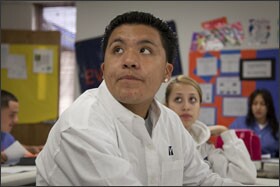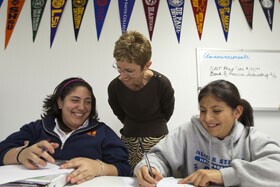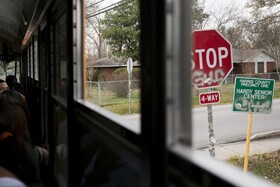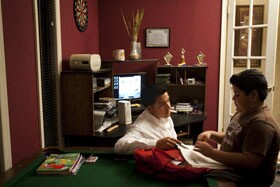Angel Leon, 10th grader at YES Prep
—Video by Smiley N. Pool for Education Week
Tenth graders Angel Leon, Imelda Tinajero, and Monica Torres have much the same plans when they finish high school: Unlike their parents, they’re going to college.
“My parents, they really want me to go,” said Ms. Torres, sitting at a table recently at the North Central Campus of YES Prep Public Schools with her two classmates. “They don’t want me struggling like they do.”
But college isn’t just an aspiration for these students. At this charter school some 14 miles north of downtown Houston, it’s a requirement.
This is the third installment in a yearlong, occasional series examining the impact of the 1983 report A Nation at Risk.
The first installment was published on April 23, 2008, as the 25th anniversary of the report was being marked. It explored concerns about global competition and efforts by policymakers and educators to benchmark American performance against that of students in competitor nations.
The second, published Sept. 24, looked at U.S. progress toward finding more time for children’s learning. In the fourth and final installment, Education Week will examine the education system of a high-performing nation as well as the systems in several other countries.
View the complete index of stories in the A Nation at Risk series.
To earn a high school diploma, each student at YES Prep Public Schools, a growing Houston-area network of charters that predominantly serves children from low-income and minority families, must be accepted into at least one four-year college or university.
With the credo “Whatever It Takes,” the network has been built—and continually refined—to increase the odds that college admission and success are achievable for all its students.
“It basically trickles down from there in everything we’re doing,” said Christopher J. Barbic, the founder and head of YES Prep, whose five campuses, now serving 2,600 students, have consistently earned high rankings under the Texas accountability system, as well as national attention.
With its high ambitions, YES Prep in many ways is answering the call made a quarter-century ago in A Nation at Risk. The report famously warned of “a rising tide of mediocrity” in U.S. education. And while it stopped short of saying all students should go to college, the report urged schools and colleges to embrace “high expectations and goals” for all students, regardless of race, class, or economic status.
The YES approach echoes core prescriptions put forth in A Nation at Risk, from adopting stronger graduation requirements and embracing more rigorous and measurable standards, to providing extended learning time—with a longer school day and school year, including mandatory summer school.
In addition, YES officials are sharply focused on offering a highly talented faculty. They are working on ways to better recruit, retain, and reward teachers, including plans to devise performance-based compensation and a “master teacher” track, ideas also espoused in the 1983 report.
YES, whose name is short for Youth Engaged in Service, caps the size of its schools at 750 students in grades 6-12. The model seeks to create tightknit school communities with high expectations both for student academics and behavior, and to offer intensive college counseling as well as alumni support to help graduates stay on track.
YES’ eventual goal is to swell the number of low-income and minority Houstonians who earn college degrees, by growing to more than a dozen schools educating some 10,000 students.
Shooting High
The nonprofit YES Prep network grew out of a single school first granted a charter by Texas in 1998.
Mr. Barbic, a Teach For America alumnus who taught for six years in the 200,000-student Houston Independent School District, said he got the idea to make college acceptance a requirement from the Chinquapin School, a small, private school that targets low-income, mostly minority students from the Houston area.

“When we started this, there wasn’t any other public school we were aware of that was doing that,” he said.
The power of the mandate, Mr. Barbic suggests, is that it sets very clear, and high, expectations for both staff members and students.
“We didn’t want there to be any mystery,” he said. “Everybody agrees on what the goal is, and everybody works toward it.”
YES Prep is still in its early stages. To date, it has graduated 363 students from eight classes, all from the original campus. The other four campuses are still building up, one grade at a time, to their full complement of grades 6-12. The North Central campus, which opened in 2003, will graduate its first class in 2010.
Eighty-four percent of YES graduates so far, or 306 students, have either earned degrees from or are still enrolled in postsecondary institutions.
Alumni have attended some 250 colleges and universities, from highly selective, out-of-state schools such as Columbia University, Stanford University, and Oberlin College, to in-state campuses including Texas A&M University and the University of Houston. More than half of graduates enroll out of state.
YES Prep serves 2,600 students at five Houston-area campuses.
80% of students are from low-income families.
98% are Hispanic or African-American.
90% are first-generation college-bound.
84% of YES alumni have graduated from or are still enrolled in postsecondary institutions.
Source: YES Prep
That said, not all students stick with the precollegiate program. In the past four graduating classes, on average 41 percent of 6th graders eventually earned a high school diploma from YES, and 69 percent of 9th graders did so.
All of the students who left YES from those classes enrolled in other schools, but the organization does not track them over time.
YES officials say their schools’ persistence rates are higher than in many Houston-area schools, where student mobility is a big issue. But they emphasize that the network is taking steps to do better.
“We’re very focused on trying to keep as many kids with us from year to year,” Mr. Barbic said.
To help make college a reality, YES leaders say the schools deliver a challenging academic program, requiring that all students take at least one Advanced Placement course. And a lot of students take more.
“We try and teach the courses at a rigor that is comparable to what you’re going to find at some of the better private schools in the area,” said Jennifer L. Hines, YES’ chief program and people officer. “Now, do our kids need more help and more guidance to get that content and to achieve at those levels? Absolutely.”
Most students arrive in the 6th grade at least one grade level behind in reading and mathematics.

“I think it’s hard in a good way,” said Ms. Tinajero, one of the 10th graders at the North Central campus. “It helps you with college, because you’re already prepared.”
“It’s a lot of work, but you get help if you don’t understand it,” even outside school hours, said Mr. Leon, her classmate. “Teachers give you their phone number.”
Visiting College Campuses
Another key component is hands-on college counseling.
“We went out and looked at all the best programs—public, private, suburban, urban,” said Donald M. Kamentz, YES’ director of college initiatives. The YES schools offer a 40-to-1 ratio of students to counselors in the senior year, though the counselors also teach a class to juniors.
“In most public schools, it is 250- or 300-to-1,” he said.
The counselors help students with everything from preparing for college-entrance exams to narrowing their selection of schools, filling out applications, and navigating the financial-aid system. In fact, YES itself provides some scholarship aid to students.
Also, YES sponsors and organizes trips for all students to colleges and universities, both locally and in other parts of the country.
Teacher Emily L. Peck from the North Central campus said she is leading a group of 11th graders this spring to visit schools in the Midwest, including the University of Chicago, the University of Notre Dame in Indiana, Elmhurst College in Illinois, and her alma mater, Northwestern University, outside Chicago.
“They need to be exposed to what college is,” she said. “It needs to be something tangible that they can see what it is and they want it.”

In addition, YES has set up an alumni-support system to help keep tabs on students when they reach college and provide ongoing support, such as organizing events to bring alumni together and linking them with local mentors.
To date, the YES network’s results have drawn widespread notice and philanthropic support.
In fact, the North Central campus was one of 26 schools nominated in December by the Texas Education Agency to get a Blue Ribbon award from the U.S. Department of Education. The schools also appear to be in high demand, with a waiting list across campuses of about 3,000 students.
Cherrypicking Motivated Parents?
Some observers argue, however, that in operating schools of choice, YES attracts more motivated families, even if demographic data suggest they serve a disadvantaged population. The schools are all open enrollment and admit students through a random lottery.
Gayle Fallon, the president of the Houston Federation of Teachers, an affiliate of the American Federation of Teachers, says that factor skews comparisons with urban systems like the Houston district.
“I think they’re a great program, but sometimes I regret the comparisons we get to them,” she said of YES. “They may be working out of the same neighborhoods, but they are cherrypicking the motivated parents, and as any teacher knows, no one motivates a child more than a motivated parent.”
“You can make the argument that there is a certain level of motivation that exists. That’s fair,” said Mr. Barbic. “But what I do know is the kids who come here, relative to what they’d be doing in HISD, is not the same. ... We’re changing the trajectory of what they could do, regardless of how they get to the school.”

Still, it’s not always easy to maintain the college-going ethos, as the North Central campus recently learned. In December, the school discovered that about half the 10th graders cheated in some form on end-of-semester exams.
“It was a huge wake-up call,” said Mark A. DiBella, the school director. The incident led to the expulsion of two students, lesser penalties for others, and to readministration of the exams for many students.
Mr. DiBella said his goal was not simply to take disciplinary steps, but to make the incident a teachable moment.
The core message to students, he said, was: “It’s time to own what you did, and let’s learn from it.”
“I’m more interested in how it was handled,” Mr. Barbic said of the situation. “How was it used by the campus leadership and staff to reinforce why we’re here, and what the values are?”
The ultimate test for YES will be how the charter network fares over time, given its ambitious growth plans.
Part of the idea, Mr. Barbic said, is to become a force in Houston that is too big to ignore or dismiss. He hopes the schools can serve as a model of what’s possible with disadvantaged students, while also applying pressure on nearby public schools.
“At some point, it has to translate back,” Mr. Barbic said. “We want to create a little pain, but also show up with a prescription.”
‘Talent Can Trump a Lot’
In addition, YES is working to collaborate more with other public schools. To that end, the newest YES campus is sharing space with a school in the Houston district.
The YES growth is running in parallel with a major expansion by the Houston cluster of Knowledge Is Power Program, or KIPP, charter schools. Over the next decade, KIPP aims to expand to 42 schools in the Houston area serving 21,000 students in grades pre-K-12.
Together, the two charter networks, which both try to create strong college-going cultures and often share ideas, collectively could eventually serve more than 30,000 students.
George V. Grainger, a senior program officer at Houston Endowment, a private philanthropy that has given $10 million each to YES and KIPP to help with the expansion, said he finds the work of both groups very promising, but cautions that it won’t be easy to deliver the same quality as they grow.
“It’s a large-scale experiment,” he said. “Can you have a dramatic increase in postsecondary credentialing through this dramatic growth?”
“They’ll have a lot of obstacles in their way over the next five to 10 years, but at the end of the day, talent can trump a lot of obstacles,” Mr. Grainger added. “And that’s what we’re investing in.”





